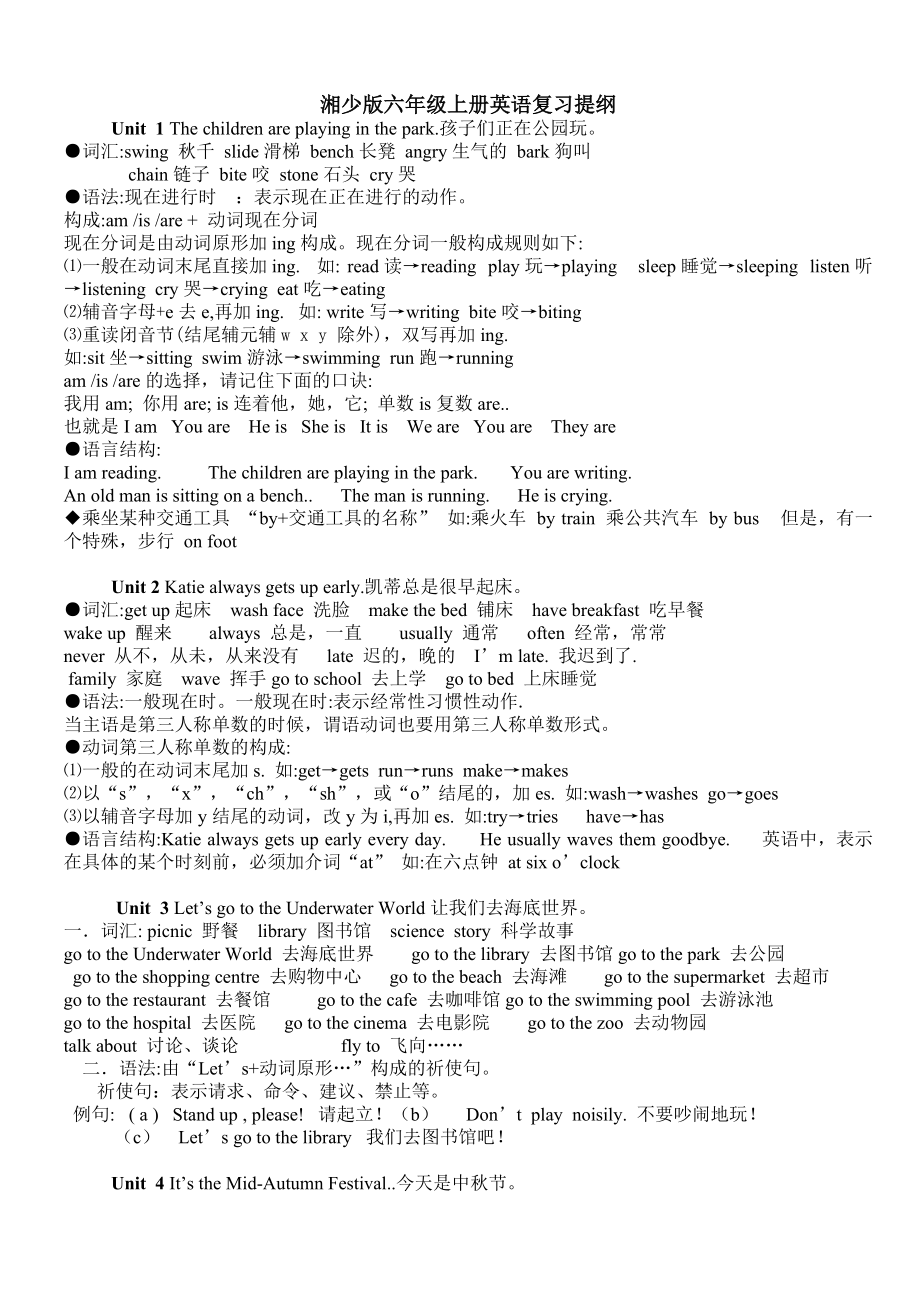 湘少版六年级上册英语复习重点1
湘少版六年级上册英语复习重点1



《湘少版六年级上册英语复习重点1》由会员分享,可在线阅读,更多相关《湘少版六年级上册英语复习重点1(4页珍藏版)》请在装配图网上搜索。
1、湘少版六年级上册英语复习提纲Unit 1 The children are playing in the park.孩子们正在公园玩。词汇:swing 秋千 slide滑梯 bench长凳 angry生气的 bark狗叫 chain链子 bite咬 stone石头 cry哭语法:现在进行时 :表示现在正在进行的动作。构成:am /is /are + 动词现在分词现在分词是由动词原形加ing构成。现在分词一般构成规则如下:一般在动词末尾直接加ing. 如: read读reading play玩playing sleep睡觉sleeping listen听listening cry哭crying
2、eat吃eating辅音字母+e去e,再加ing. 如: write写writing bite咬biting重读闭音节(结尾辅元辅w x y 除外),双写再加ing. 如:sit坐sitting swim游泳swimming run跑runningam /is /are的选择,请记住下面的口诀:我用am; 你用are; is连着他,她,它; 单数is复数are.也就是I am You are He is She is It is We are You are They are 语言结构:I am reading. The children are playing in the park. Yo
3、u are writing. An old man is sitting on a bench. The man is running. He is crying.乘坐某种交通工具 “by+交通工具的名称” 如:乘火车 by train 乘公共汽车 by bus 但是,有一个特殊,步行 on footUnit 2 Katie always gets up early.凯蒂总是很早起床。词汇:get up起床wash face 洗脸make the bed 铺床 have breakfast 吃早餐 wake up 醒来 always 总是,一直 usually 通常 often 经常,常常 n
4、ever 从不,从未,从来没有 late 迟的,晚的 Im late. 我迟到了. family 家庭 wave 挥手go to school 去上学 go to bed 上床睡觉语法:一般现在时。一般现在时:表示经常性习惯性动作.当主语是第三人称单数的时候,谓语动词也要用第三人称单数形式。动词第三人称单数的构成:一般的在动词末尾加s. 如:getgets runruns makemakes以“s”,“x”,“ch”,“sh”,或“o”结尾的,加es. 如:washwashes gogoes以辅音字母加y结尾的动词,改y为i,再加es. 如:trytries havehas 语言结构:Kati
5、e always gets up early every day. He usually waves them goodbye. 英语中,表示在具体的某个时刻前,必须加介词“at” 如:在六点钟 at six oclock Unit 3 Lets go to the Underwater World让我们去海底世界。一词汇: picnic 野餐 library 图书馆 science story 科学故事 go to the Underwater World 去海底世界 go to the library 去图书馆go to the park 去公园 go to the shopping ce
6、ntre 去购物中心 go to the beach 去海滩 go to the supermarket 去超市go to the restaurant 去餐馆 go to the cafe 去咖啡馆go to the swimming pool 去游泳池 go to the hospital 去医院 go to the cinema 去电影院 go to the zoo 去动物园talk about 讨论、谈论 fly to 飞向二语法:由“Lets+动词原形”构成的祈使句。 祈使句:表示请求、命令、建议、禁止等。例句: ( a ) Stand up , please! 请起立!(b) Do
7、nt play noisily. 不要吵闹地玩!(c) Lets go to the library 我们去图书馆吧!Unit 4 Its the Mid-Autumn Festival.今天是中秋节。一词汇: magic 神奇的 medicine 药 miss 想念 lonely 孤独的 mooncake 月饼 egg yolk 蛋黄 grape 葡萄 tea 茶二语法:一般过去时。 1、判断标志:句子中有表示过去的时间。 yesterday 昨天 yesterday morning 昨天早上 the day before yesterday前天last night 昨晚 last week
8、 上周 last month 上个月 last year 去年just now 刚才 two days ago 两天前 in 1990 等.三, A 规则动词的过去式变法:(1)一般加-ed .例:looklooked playplayed wantwanted missmissed(2)有e直接加-d. 例: livelived useused(3) “辅音字母+y”改y为i再加-ed例:study studied try tried(4).重读闭音节(结尾辅元辅,w x y 除外),双写再加-ed例:stopstoppedB不规则动词的过去式: (64面的动词过去式)如:am/iswas
9、arewere dodidgowent taketookflyflew feelfelt bringbrought see-saw eat-ate buy-bought come-came swim-swam run-ran read-read teach-tought Unit 5 The children are playing noisily.孩子们正在喧闹地玩。一词汇:living room客厅 、room房间phone电话clearly清楚地;清晰地noisily吵闹地quietly安静地heavily严重地 、slowly慢地 、quickly快地 、happily高兴地、poli
10、tely礼貌地 、carefully小心地二语法:副词一般由形容词+ly构成;规则: 1.一般直接在形容词后加ly如: loudloudly 大声地politepolitely 有礼貌地carefulcarefully 小心地、仔细地 quickquickly 迅速地 softsoftly 轻轻地、柔软地clearclearly 清晰地 quietquietly 轻轻地 slowslowly 慢慢地2.辅音字母+y改y为i,再加ly。例Heavy-heavily重地happy-happily幸福地noisy-noisily 喧闹地三 语言结构: 1.Peter is opening the d
11、oor politely. 2. Mingming is singing loudly. 3.Anne is eating quickly.4.Lingling is walking carefully.5.Mr Li is sleeping noisily.6.Mrs Zhao is dancing happily. 7.Speak loudly . Dont speak softly.注:副词修饰动词,一般放在被修饰动词的后面Unit 6 How tall are you?你有多高?一,词汇: weak虚弱的worried但新的doctor医生little小的tall高的age年龄heav
12、y重light轻的;灯二、语法:特殊疑问句构成:特殊疑问词+一般疑问句 特殊疑问词有: how tall 多高 how old 多大 how heavy 多重how long 多长 where 哪里 when什么时候 what 什么 who谁 whose谁的三、语言结构: How old/ tall/ heavy are you? 例:1.What is your name? 2.Where is she from?3.How old are you? Unit7 These horns are too big.这些角太大了。一词汇:bull 公牛 field 田地 horn (动物的)角 i
13、dea 主意 ugly 丑陋的 rub 摩擦 foolish愚蠢的 kill 杀死二语言结构:These horns are too big.例如:I cant wear this coat . Its too big!Unit 8 My singing is louder than yours.我的歌声比你的响亮。词汇:louder 更大声的 than 比 garden 花园 smaller 更小的 bigger更大的 hole 洞 pleased 高兴的一、 语法:形容词的比较级 A is/are +形容词的比较级 + than B 表示A比B更怎么怎么样二、 语言结构:My singin
14、g is louder than yours. 例如:1、John is thinner than Tony.1、 The smaller bird became thinner and thinner .It sang softer and softer.三、 形容词的比较级:1、直接加er: old-older cheap-cheaper tall-taller short-shorter long-longerloudlouder small-smaller 2、 重读闭音节,双写再加er: fat-fatter thin-thinner big-bigger 3、 不规则的:good-
15、better much/manymore Unit 9 What is Dongdong going to do?东东将要做什么?词汇:monkey 猴子 pick up 拾起 put down 放下 shout 大声喊 towards朝 sclod批评 throw at 朝哪里丢一、 语法:由“be going to”构成的一般将来时:表示将要发生的事情二、 语言结构:一般将来时的特殊疑问句-What is she/he going to do ?-She/he is going to 例如:1、-What is Dongdong going to do ? -He is going to
16、pick up a stone. 2、What is he going to do ? He is going to throw the stone at the tiger.3、 What is she going to do ?She is going to shout at Dongdong.Unit 10 Are you going to visit Anne?你将要去拜访安吗? 词汇:walk down 沿着。走下来 roller-coaster 滑冰 machine 机器 merry-go-rond 旋转木马 park 公园 follow跟着 visit 拜访 stair 楼梯 f
17、ilm 电影 excited 兴奋的 huge 巨大的一、 语法:一般将来时的一般疑问句二、 语言结构:-Are you going to ? -Yes, I am ./No, Im not. 例如:1、-Are you going to visit Anne? -Yes, I am ./No, Im not. 2、Are you going to out ,Lingling ? Yes, I am ./No, Im not. 3、Are you going to see a film? Yes, I am ./No, Im not.4、Are you going to buy somethi
18、ng? Yes, I am ./No, Im not.5、Are you going to buy something for me ? Yes, I am ./No, Im not. Unit 11 When are we going to swim?我们什么时间将去游泳?词汇:soon 马上 bookstoer 书店 beach 沙滩 sand 沙子 dangerous 危险的 swimming suit 游泳衣 put on 穿上语法:一般将来时的特殊疑问句:疑问词+一般疑问句一、 语言结构:1、-When are we going to swim ? -We are going to
19、swim at 2 oclock. 2、What are we going to do ? We are going to swim. 3、Who are we going to meet ? We are going to meet Anne, Peter and Mingming.4.Can we have lunch first?Yes, we can ./No, we cant. Unit 12 Christmas圣诞节一.词汇:Christmas 圣诞节 present 礼物 open 打开 Santa Claus 圣诞老人 stocking 长筒袜 card 卡片 bike 单车
20、computer 计算机 robot 机器人 二、语言结构:1、Merry Christmas! 2、Christmas Day falls on 25 December . 3、People put up a Christmas tree in their home . 4、They put present for family and friends under the Christmas tree. 5、He leaves present for the children in their stocking. 6、In big shopping centers, Father Christmas gives presents to children.
- 温馨提示:
1: 本站所有资源如无特殊说明,都需要本地电脑安装OFFICE2007和PDF阅读器。图纸软件为CAD,CAXA,PROE,UG,SolidWorks等.压缩文件请下载最新的WinRAR软件解压。
2: 本站的文档不包含任何第三方提供的附件图纸等,如果需要附件,请联系上传者。文件的所有权益归上传用户所有。
3.本站RAR压缩包中若带图纸,网页内容里面会有图纸预览,若没有图纸预览就没有图纸。
4. 未经权益所有人同意不得将文件中的内容挪作商业或盈利用途。
5. 装配图网仅提供信息存储空间,仅对用户上传内容的表现方式做保护处理,对用户上传分享的文档内容本身不做任何修改或编辑,并不能对任何下载内容负责。
6. 下载文件中如有侵权或不适当内容,请与我们联系,我们立即纠正。
7. 本站不保证下载资源的准确性、安全性和完整性, 同时也不承担用户因使用这些下载资源对自己和他人造成任何形式的伤害或损失。
